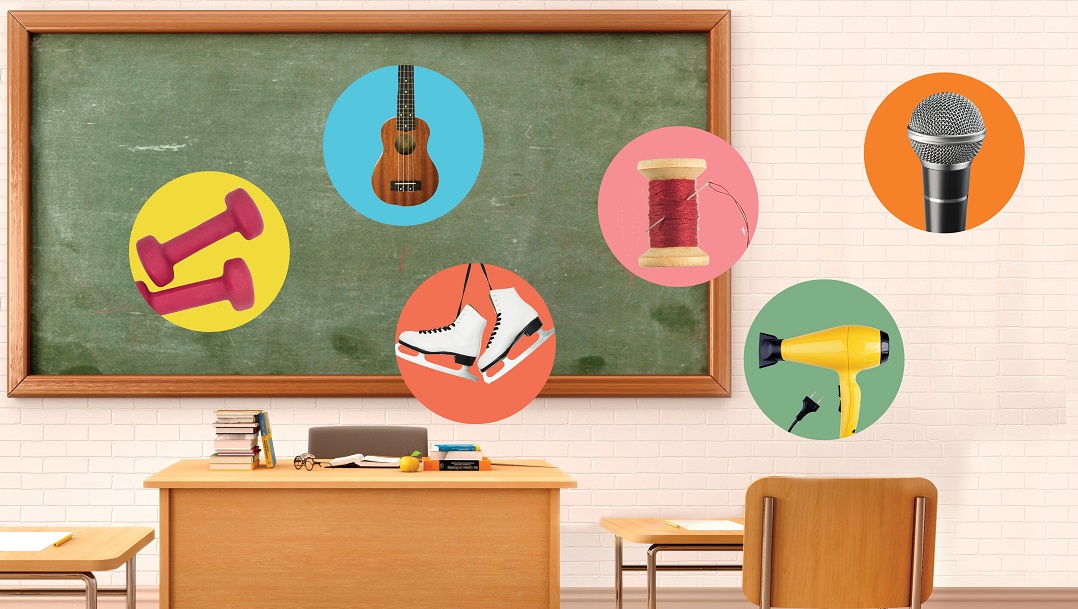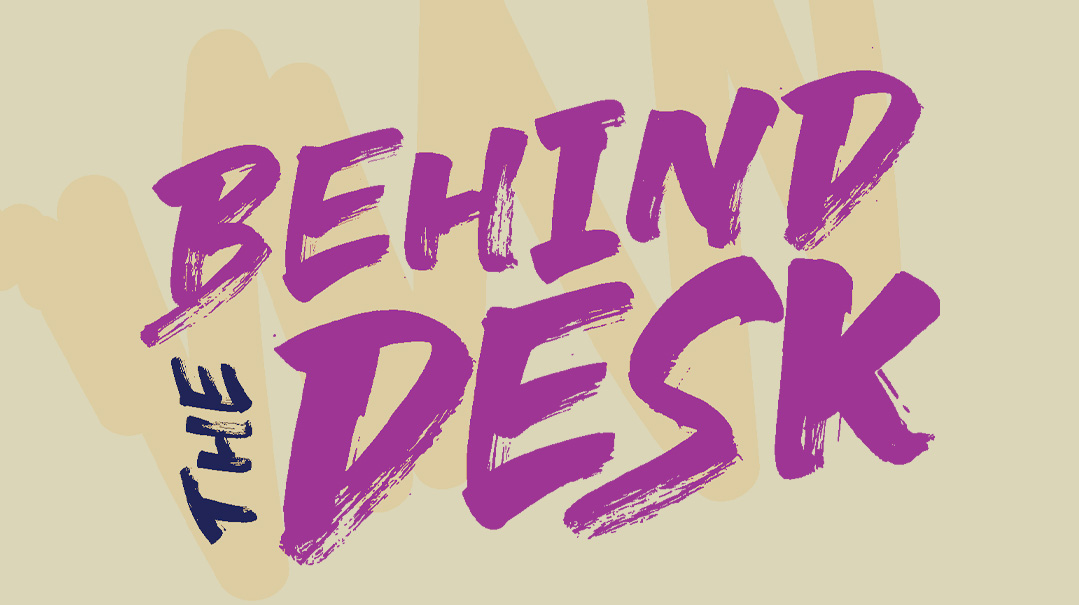Beyond the Classroom
| November 20, 2019Teens take learning in a different direction

A
s teenagers, many people dream of taking lessons of one sort or another, to learn a new skill or just to have plain old fun. I, too, had lots of hobbies as a teen and wanted to expand my knowledge base. I wanted to learn an instrument (that never happened), I wanted to learn ballet, but that never happened either. I ended up only doing the basic (boring) stuff like swimming lessons, chasunah dancing, and exercise classes. Although there are many people like me, who dream big dreams and they remain just that, dreams, there are some girls who make the effort to make their dreams come true. Taking interesting kinds of lessons and learning uncommon skills isn’t as uncommon as many of you might think!
“When I was younger, my older sister started ice skating and I went skating with her a few times,” Raizy Cohen of Toronto shares. “I really enjoyed it. In addition, I took dancing class when I was young. Two years ago, when I was in tenth grade, some of my friends suggested that we take figure skating lessons. I loved skating from the beginning and lessons were even better! Figure skating is generally considered graceful dancing on the ice. Nowadays it’s a lot more than that; we also do all types of ice dancing. Jumps and spins are some of the skills incorporated into the many steps we use on the ice.”
It is more typical to start figure skating lessons at a younger age but Raizy was a quick learner and also came in with plenty of dance experience from her high school years. “My friends eventually stopped taking the lessons but I enjoyed them so much that I continued without them. In my case the lessons aren’t a social outlet anyway. I take them because I get personal enjoyment.” And the benefits are many.
“I consider figure skating fun exercise, a real workout. It’s dancing with a twist because you can move even more on ice than on a gym floor. The coach plays a big part in the lessons, so it’s important to use someone you like and can learn from.”
Researchers have found that there are numerous benefits to engaging in extracurricular activities. Interestingly enough, extracurricular activities have even been found to improve academic performance. The positive feeling a person experiences after enjoying an extracurricular activity often carries over to schoolwork. Success breeds success! Extra activities can increase brain function, and help with time management, as well as stamina and endurance. In addition to exploring new interests, extracurricular activities can offer social opportunities out of school, increase self-esteem, and teach important life skills that can carry over into other areas in life. Sound worth the time and effort.
For seventeen-year-old Shelly Abraham of Los Angeles, her primary goal in taking kickboxing classes is the social aspect. Kickboxing is self-defense turned into exercise with steps including punching and kicking (the air, not people!). Shelly says she started kickboxing when she was looking for a fun way to work out with friends.
“I used to run for exercise, but I got bored of that after a while. Last year my friend told me about an all-women’s gym that offers kickboxing. So, I tried it and liked it. I try to go every day because there are different classes daily but realistically, I end up going three times a week. I usually do it after school or sometimes early in the morning before school.”
Esty Ravitz of Monsey describes the ukulele as, “similar to a guitar with four strings and creates sweeter music. I started taking lessons two years ago when I was in eighth grade.”
Why the ukulele?” I ask.
“My mother pretty much chose it for me because she likes the sound! I already knew how to play piano, so when I first started it was easier for me to learn the notes. My lessons are held once a week, every other week after school, year-round. For me the lessons are a lot of fun, so I don’t need a break. Though I sometimes take a break during the summer if I go away.”
“How long will you take lessons for?” I ask.
“The lessons pretty much allow me to go at my own pace. The more I learn, the more advanced learning I can still do. I could technically finish at some point, but right now I feel like I still have a lot to learn. I love it. I get a certain thrill when I finish a song. It really is a good way to let out stress. It is a good outlet at the end of a hard day at school.”
Thirteen-year-old Pessy Weintraub of Passaic concurs with Esty.
“When I go horseback riding, I feel relaxed and free,” Pessy enthuses. “I really look forward to my weekly lessons. I can run, trot, or jump with the horse. I can even figure out a horse’s personality when I ride it. I can see if it is kind, gentle, or stubborn by the way it trots. I’ve ridden many horses over the years. One horse I ride is named Clover. When she trots, she has a little beat to her step, so she’s really fun to ride. We get along very well. When I turn my body to the right, she feels my body moving and moves to the right on her own without me having to use my ring to pull her. The only way to ride well is to understand the horse. It is very similar to dealing with friends and people in general and it’s the key to interacting with them.”
“How old were you when you started riding?”
“I don’t remember exactly what age, but I was very little. I had a neighbor whose mother grew up in Texas. She wanted her daughter to ride horses. I started the lessons with her but eventually she dropped out and I continued. I now ride once a week, even in the winter, when I ride indoors.”
I had never even heard of pattern making before I spoke to Miriam P. of Beitar, Israel.
“I like sewing and I wanted to become more professional and know how to make whatever patterns I wanted to sew on my own. Pattern making allows me to make any style I want and to make it fit whoever I’m making it for,” Miriam explains.
“I started to learn how to sew when I was twelve. When I was sixteen, I took a six-month course crammed into three months. I actually found the course itself quite boring,” Miriam says. “I was used to sewing classes that are more exciting and busier, while pattern classes are much less interesting. You just sit with a paper and don’t do much else. It’s more like school — a lot of math and precise drawing and taking notes. At least I enjoyed the social aspect. I did the course with two friends my age and three older friends, too.”
I amazed at the creativity and dedication of these teens, even before I meet Gila.
“I always enjoyed doing hair and I wanted to learn proper technique,” explains Gila Wieder from New York, “so I took a haircutting and hairstyling course at the beginning of tenth grade. I really enjoyed it and gained a lot, though the best way to become a great hairstylist is to practice, practice, practice after the course.
“Among teens, a basic haircutting and styling course is not so unusual, but most girls don’t take such an extensive course until they’re older. I did the course in 90-minute increments at night, usually on Mondays and Wednesdays. Because they were private lessons the schedule was flexible, and I was able do it at my own pace and I didn’t have to worry about peer pressure or who was ahead of me.”
“Do you plan on making a career of hairstyling and cutting?”
“I would definitely want to do it as a side job. I already started to take on some clients after school at a discounted price as a way of getting experience and breaking into the field. To gain more experience, I started by offering all my friends and neighbors free haircuts. Even now I’ll sometimes give girls haircuts during recess in school. It’s just more convenient for them than having to come over after school!”
Miriam P. feels differently and says she doesn’t plan on using her pattern making professionally.
“I would like to use the skill to sew for my kids, im yirtzeh Hashem,” she explains. “I’ve already made plenty of patterns that I’ve used to sew, including the tops for two-piece gowns for myself and my mother for my uncle’s wedding, Shabbos clothing for myself, and matching outfits for my little sisters. I also made patterns for friends who know how to sew but don’t know how to make patterns.”
I ask Shelly if she sees herself using kickboxing at all in the future. “The only way I can see myself using kickboxing in the future is if I ever decide to teach it,” Shelly muses.
And for Pessy, while she loves riding horses, she only gets to do so during the lessons themselves. “It’s okay though, I enjoy it when I can. It’s kind of like skiing, for instance, which you can only enjoy while on the slopes. I enjoy it when I do it and I don’t need any special equipment. Anyone can be good at anything as long as they love doing it.”
Well said, Pessy!
Go for It!
The Ratzon Program by Malky Giniger
When did you start your talent school and why?
“The reason I started it was because I love singing, harmonizing, dancing, and performing! When I was a kid, there really weren’t choirs to join and I wish there had been. I’ve been performing on my own here and there since the age of eight. When I would perform, mothers often approached me and asked me if I could include daughters. I realized there was a real need for some sort of creative outlet that would give girls the opportunity to shine.
“I started offering official auditions at twelve years old, when I put together a choir called Voices of Youth. It was half choir, half voice and dance training. I wrote the songs, made costumes, and directed it — it was my passion. The girls in the older division of my choir were older than me! Someone else offered to produce the show; he paid for the hall and other expenses and we did it to twice to benefit tzedakah organizations.
“I then began recording tapes with the Voices of Youth group and sold them. I put the money I earned from sales toward my next production. I also did other side jobs to earn money, like teaching piano and voice. All through high school and seminary I continued to put out more tapes from Voices of Youth. After I got married, I continued teaching private clients.
“When I started giving voice lessons, people would ask me, ‘Who takes voice lessons? Why would someone do that? People take piano lessons, but voice?’ After two years of marriage I decided to stick with giving voice lessons, but stopped teaching piano and gave thirty of my students to a friend of mine. Even after that I couldn’t accommodate all the girls that wanted to join, so I started grouping girls together and doing recitals. After each recital more girls wanted to sign up. I realized then that I needed to start grouping the girls by age and level so that I could reach and teach more girls. We moved to a more spacious location and continued doing recitals. Twenty-seven years later, the program has now evolved into a full talent school, offering much more than just voice lessons.
“The explosion occurred when mothers started asking me about adding dance classes and offering other outlets. I started training other teachers and we expanded. Many of my students then joined my school as teachers. The location I currently run is in my home in Brooklyn and I have programs running in Lakewood, Monsey, Passaic, Philadelphia, and Baltimore/Silver Spring. We’ve had in other locations as well but whether or not we open in a specific community depends on the availability of teachers in those places.”
What lessons do you offer in your school?
“Singing, acting, dancing, crafts (prop building), tap dancing, guitar, piano, and private lessons in other instruments.”
What age do you start with and until what age does it go?
“Officially a girl can join at age three. But we’ve even had some two-year olds who can handle it. On the other end of the spectrum, we’ve had ladies over 70 joining.”
Are there any prerequisites for joining?
“No. We have all types of girls in the school. We have some girls with special needs, girls who cannot sing but want to learn how, and girls who have special talents that they want to develop further.”
How do you feel the lessons impacts a girl’s social and emotional development?
“I find it has an incredible impact. Once they learn techniques and methods, they gain tremendous confidence. It is not only confidence building, but gives the girls a certain sense of comfort and ease when dealing with other people. I encourage the girls to allow for mistakes and learn to correct them. The girls learn honesty with themselves and others. They learn teamwork as well as the fact that not everything and everyone needs to be same. The students also learn to accept others, as each class is made up of all types of girls.”
Did any of your graduates go on to do anything using the skills they learned?
“Many of my students did. Some of my students move to other communities and open a branch of Ratzon on their own. I also offer studio training, which didn’t exist in my day, and lots of girls have learned to use a recording studio and create amazing stuff.”
Do you think talents are inborn or is this something that can be developed?
“There are different kinds of development. Talented girls have an easier time developing their talents. Hard work can definitely make a difference. There are very, very few people who cannot learn. We teach music with different methods; we teach both graphically and by ear.”
Is there any message you’d like to give girls who are considering learning something new?
“Go for something you enjoy, something that is of interest to you, not just something everyone is doing.”
(Originally featured in Teen Pages 63)
Oops! We could not locate your form.












